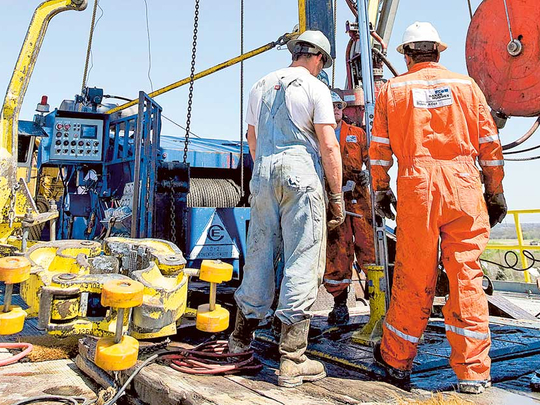
South Korea is looking at the energy sector to rebalance its trading relationship with the US and deflect President-elect Donald Trump’s protectionist rhetoric.
The sixth-largest exporter of goods to the US wants to reduce its trade surplus with the world’s top economy to avoid being named a currency manipulator. South Korea sees more US shale imports as a key to narrowing the trade gap and the government is looking at ways to boost spot energy purchases from the US.
South Korea’s aims underscore how Trump’s anti-trade stance has flipped traditional thoughts about trade balances on their head. South Korea’s trade surplus with the US was $23.4 billion (Dh85.9 billion) in 2016, up from $11.6 billion (Dh42.6 billion) in 2011, according to the Korean Ministry of Trade, Industry and Energy. Trump, during the campaign trail, blamed a 2012 trade agreement with South Korea for the loss of about 100,000 US jobs.
South Korea is monitoring whether there’s room for making additional spot purchases of US energy exports, a senior official at the trade ministry said this week. The government is sharing information with companies and plans to review the situation once the Trump administration is in place, he said.
“With the forthcoming Trump administration, refiners are getting increasing pressure from the government to buy more crude and gas from the US,” Kim Jae Kyung, a research fellow at Korea Energy Economics Institute, said by phone. “There have been on-going discussions regarding raising US energy purchases. Pressure from the government will continue to creep up as time goes and the Korean refiners will have to deal with it.”
Currency watchlist
South Korea was listed in the US Treasury Department’s currency watchlist in October, along with China, Japan, Germany, Taiwan and Switzerland, for meeting two of the three criteria used to monitor currency practices. The Korea Institute for International Economic Policy warned in a January 4 report that changes to the criteria would bring a “high possibility” of Korea being tagged a manipulator.
To avoid that, South Korea is considering increasing imports of US goods to trim the surplus, Finance Minister Yoo Il-ho said at a January 5 press briefing. The energy sector is one area where it could raise imports, specifically through shipments of US shale gas, he said.
While South Korea is a net exporter to the world, shipping out Hyundai Sonatas, Samsung Galaxies and DVDs of Korean TV dramas, it is energy poor with crude oil and natural gas among its largest import goods by value.
That makes energy a good trade match with the US, which is leveraging shale companies’ success at fracking into becoming a major energy exporter. Congress in 2015 lifted a 40-year ban against most crude oil exports and companies are spending billions of dollars to turn the US Gulf Coast into one of the top three liquefied natural gas exporters in the world.
SK E&S Co. Ltd. earlier this month bought South Korea’s first shipment of US shale LNG from Cheniere Energy Inc. Korea Gas Corp., the world’s biggest commercial buyer, this year is scheduled to begin importing 2.8 million tonnes a year of US LNG from Cheniere when it finishes a new production train. That much LNG at current Asian spot values is worth about $1.2 billion a year.
GS Caltex bought 2 million barrels of the US Eagle Fordcrude for delivery in November and December last year. Other than condensate and Alaskan oil, it was South Korea’s first crude purchase from the US after Washington removed the ban on exports. South Korea imported 301,279 tons of crude from the US in 2016.
Because of higher shipping costs, importing US oil is profitable when benchmark West Texas Intermediate is at least $6 or $7 a barrel cheaper than the Middle East marker grade Dubai, said Kim Wookyung, a spokeswoman at SK Innovation Co., South Korea’s biggest refiner. As of Wednesday, WTI for March was priced about 55 cents below Dubai, according to Bloomberg’s calculations based on PVM Oil Associates data.
An official with GS said while they seek opportunities to buy US crude, they won’t do so if it isn’t economical. So far that’s the official policy of South Korea’s Ministry of Trade, Industry and Energy, too.
The government isn’t in a position to push companies to boost imports because they are private enterprises and will make purchasing decisions based on their needs, the ministry official said.
There may be room for US oil shipments as suppliers to Korea including Saudi Arabia, Kuwait, UAE and Oman have limited the amount buyers can request as part of a deal between Organisation of Petroleum Exporting Countries and non-members to trim output.












